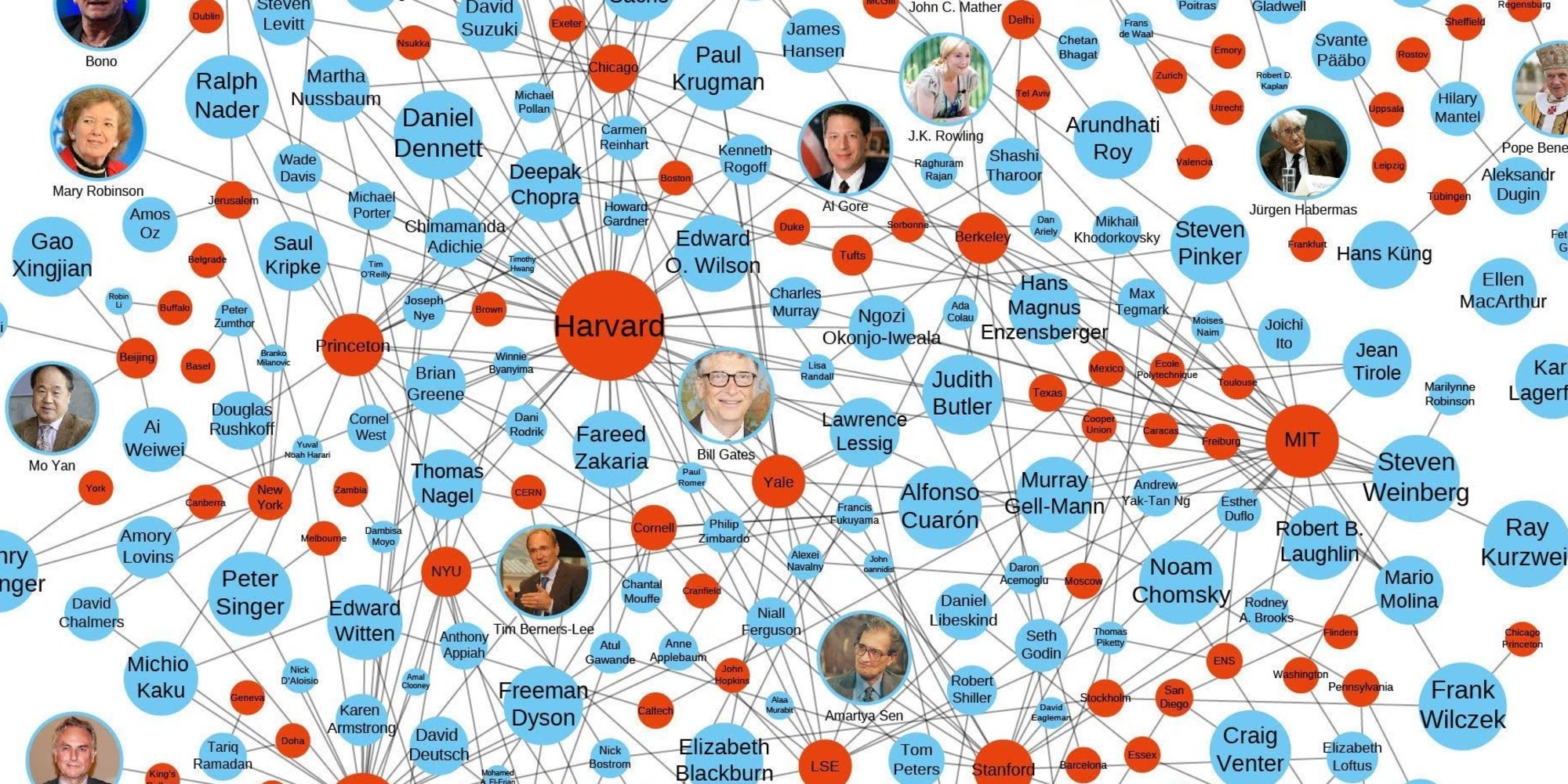These Charts Show the Most Influential People and Platforms of 2016

Each year, The WorldPost joins with the Gottlieb Duttweiler Institute in Zurich and MIT research scientist Peter Gloor to measure which thinkers and platforms are most influential on the global digital universe. For the first time, this year we analyzed the Arabic-language web as well as those in English, Spanish, German and Chinese.
Our 2016 Thought Leaders Index displays the influence rankings, maps the networks of the global conversation and explains the methodology behind the “collective intelligence” analysis.

Key Findings
There are three key findings from this year’s study:
#1. Individuals who write and speak about religion top the list of most influential global figures of 2016.
Pope Francis, the Dalai Lama and the atheist Richard Dawkins all top the global English-language list, suggesting a widespread concern with existential questions of the religious imagination as people search for a deeper response to the unsettling challenges of a world in turmoil. The top three most influential figures on the Arabic-language list are also preachers or religious thinkers.
#2. The influence of social media on the English-language web has surpassed that of established media platforms.
The new dominance of social media has split the discourse. The passionate political environment of 2016 appears to have marked a tipping point on the globally dominant English-language web, where the influence of individuals sharing information on social media surpassed that of established media platforms.
This shift matches the inversion of the old pyramid in which the authority and influence of elites in both society and the media held the most sway over the majority of the population.

Get top stories and blog posts emailed to me each day. Newsletters may offer personalized content or advertisements. Learn more
As the chart above from the Edelman Trust Barometershows, 85 percent of the public in its 2016 global survey avow low levels of trust in the authority of elites and public institutions, placing their confidence instead in peers. The remaining 15 percent of the “informed public” exhibit a much higher level of trust.
The combined result of these related developments the dominance of peer-driven social media and diminished trust in authority among the majority is the emergence of two parallel webs.
There is a burgeoning disconnect between authority and influence, between the networks of informed public debate and social media.
Though their message has profoundly shifted the political landscape, alt-right websites like Breitbart News and the virtual missives of Trump advisor Steve Bannon barely registered in established global networks of the informed public. Rather, the alt-right influence spread through social media like Twitter and Facebook by riding the wave of Donald Trump’s campaign against elite authority.
In striking contrast, thinkers in some way associated with elite institutions like Harvard University dominated the exchange of ideas among networks of the informed public. Like last year, The WorldPost/The Huffington Post, along with The New York Times, were the leading blog platforms for the broad dissemination of ideas outside social media.

The disquieting insight here is that there is a burgeoning disconnect between authority and influence, between the networks of informed public debate and social media. In short, one internet, two conversations.
#3. Social media is less influential on the Spanish and German-language web than in Arabic, Chinese and English.
Established German newspapers and sites like Die Zeit, Der Spiegel or Sueddeutsche Zeitung remain as influential, or more so, than Twitter, Facebook and YouTube.

On the Spanish-language web as well, social media has made comparatively little inroads. El Pais, the Madrid-based daily newspaper established after the fall of the Franco dictatorship, still dominates as the main platform for the dissemination of ideas.

The Arabic-language web more closely fits that of the English one, where much of the discourse is channeled through Facebook and Twitter. The most influential mainstream media is Al Jazeera and foreign sites like the BBC and The New York Times.

China Is a Universe Unto Itself
As the Shangahi-based scholar Zhang Weiwei noted in last year’s study, “The Chinese internet is a universe unto itself.” To map that universe as accurately as possible, we once again this year divided the Chinese language into two webs “inside” China with its alternative non-global networks, such as Baidu Baike and Sina Weibo, and “outside,” where the web of the Chinese diaspora, Hong Kong and Taiwan fairly fits the profile of the global, English dominated conversation. The blended map is below.

The mission of The WorldPost is to serve as a bridge in a world growing more interdependent, but in which the media is re-nationalizing and even, through social media, tribalizing into echo chambers. This year’s map of the global conversation reveals the deepening paradox whereby the information age is becoming an age of non-communication across cultural and ideological boundaries. The internet has been said to be a “global thinking circuit.” It remains global, but integrating and sustaining the “thinking” aspect is proving an ever greater challenge the more social media comes to dominate the exchange of ideas.
Read more: http://www.huffingtonpost.com/entry/most-influential-voices-2016_us_58460d62e4b028b323390cdf
